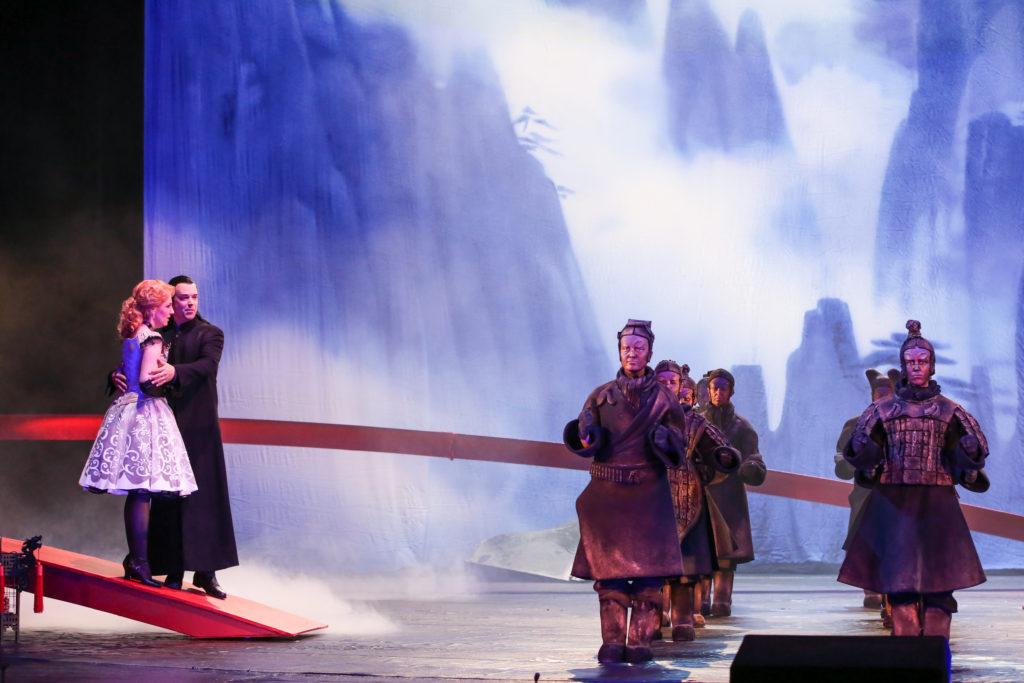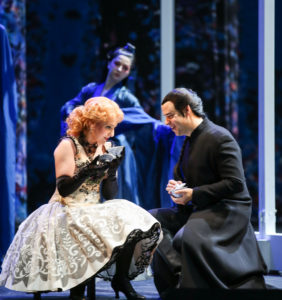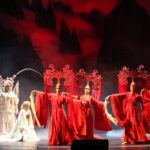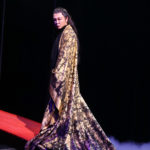 Franz Lehár’s (1923) Das Land des Lächelns, following Puccini’s Turandot, and Gilbert and Sullivans The Mikado, seems, superficially, a product of the cult of the oriental. Problematic in our Post-modern, post-colonial world, uneasy with the patronising stance of the westerner to the ‘cute’ exotic and its people. Are we big enough to put aside political correctness, and enjoy this operetta as dazzling entertainment, and Lehár’s music, its songs enduring classics of the repertoire? In fact, Lehár’s operetta is no mere pastiche, his real-to-life, psychologically modern characters, upturn the stereotypes, in the witty libretto.
Franz Lehár’s (1923) Das Land des Lächelns, following Puccini’s Turandot, and Gilbert and Sullivans The Mikado, seems, superficially, a product of the cult of the oriental. Problematic in our Post-modern, post-colonial world, uneasy with the patronising stance of the westerner to the ‘cute’ exotic and its people. Are we big enough to put aside political correctness, and enjoy this operetta as dazzling entertainment, and Lehár’s music, its songs enduring classics of the repertoire? In fact, Lehár’s operetta is no mere pastiche, his real-to-life, psychologically modern characters, upturn the stereotypes, in the witty libretto.
In a palatial reception room, huge windows looking onto pink-blossoming orchards,(handsome sets by Hans Hauser), Lisa (Ursula Pfitzner), lies across a grand piano. She’s been presented with red roses; the toast of her father Count Lichtenfield’s regiment, she’s won the horse-riding event again. She’s ‘charming’, but very much her own woman. Pfitzner, brunette, dressed in a snazzy, white-lace, dress, silver-embroidered, sings of FLIRTING: ‘You can flirt with anyone, but love comes just once in a lifetime.’
Her girl friends bring her a gift from visiting Chinese Prince Sou-Chong. The gift charms her because it’s exotic…But Gustl, aka Lieutenant Gustav, her suitor, (Michael Havlicek), is irritated by her fascination for the ‘stranger’. Havlicek, a fine tenor, but always formal, in black; straight, rather boring, Viennese high society. The officers discuss his chances, but conventionality isn’t for Lisa. Pfitzner leans dreamily – star-struck- over her piano.
The screens of the panoramic windows open onto a view of Chinese blossoms. Vincent Schirrmacher’s Sou-Chong, in a surprisingly powerful aria for so-called operetta, bares his secret thoughts. And Lehár (and librettists Herzer and Löhner) engage seriously with the anxiety of cultural difference. Schirrmacher sings, I enter the room with longing. What does she know about him, and the passion consuming him? Is he just a plaything, a foreigner to her? ‘We just keep smiling; we never show our true faces.’
 Now the windows moved round, she sees him, symbolically distanced through the glass. She comments on the fragrant, delicate scent from his land. They sit having tea together. In their duet, intoxicated with each other, ‘like in a novel, the European lady and the Mandarin.’
Now the windows moved round, she sees him, symbolically distanced through the glass. She comments on the fragrant, delicate scent from his land. They sit having tea together. In their duet, intoxicated with each other, ‘like in a novel, the European lady and the Mandarin.’
Sou-Chong has to return to China. How different you are from us, Pfitzner sings.- What do you mean, we are all people. – She meant ‘special’. So he’s returning: doesn’t it hurt him to part from her? Sou-Chong’s ridden with anxiety, still uncertain of her feelings. Don’t you see my face is foreign to you? But they declare their love, and embrace. They’re front of a stage, beautifully composed, with a red carpet signalling their exit. Tremendous passion, and Lehár’s music immaculately played by Vienna Volksoper orchestra under Guido Mancusi.
Act 2, a Chinese entree, a woman dancer in white-and-blue banners, floats across the stage. Background, a pastiche Chinese landscape, traditional blue-white porcelain come-to-life. Front stage, a ritual dance with a dragon, girls in petal-pink with sabres. In contrast, two rows of fierce warriors. Sou-Chong’s uncle totters over a red bridge to welcome him into the ancient order of his ancestors. Schirrmacher wears a lustrous gold cloak, but must prove worthy of the distinction. And he’s warned, he cannot be the slave of women.
Meanwhile, no wonder Lisa feels alienated and thinks of Europe. But in Lehárs gorgeous aria, Sou-Chong assures her, she’s die Erste; sees her, and only her, sung to a melting violin solo. In a beautifully constructed scene, her long gown in white, his gold cloak trailing, under clever lighting, they’re see in pools of white and gold. Pfitzner and Schirrmacher, both exceptional singing in their duet.
But Sou-Chong, instructed in his duties, MUST MARRY FOUR BRIDES! (But I am married, he remonstrates.) Four girls in black cavort side stage. He has agreed to marry the Manchu girls, but assures her the ceremony is meaningless, bedeutungslos.
Now a spectacular of dancing girls in white, see-through, transparent lace. Vienna State Ballet, under Allen Yu, offer us remarkably virtuosic dance sequences; like you hadn’t expected in operetta. A male dancer, all-in-white, with crimson head gear, is like an exotic insect. Four dancers in crimson, wearing built-up, brocaded head pieces, tower over them. 
The ballet opening Act 3, is also a story of its own. A stage full of white-and-pink clad dancers, with their ribbons and roses, waving their banners side-to side; watched by poor Pfitzner’s Lisa side of stage. Backstage, in silhouette, four dancers, stripped virtually naked. Pfitzner anxiously breaks away, and rushes through them to exit.
From sublime to ridiculous…A man, Havlicek’s Gustl, in his black deejay, swings across the stage. They’ve come to rescue her? In a comedy sketch (that could be G&S), a eunuch from an ancient line of eunuchs, offers to get Gustl -her Viennese suitor, remember!- into the harem, for a bribe, ostensibly to rescue Lisa.
Lisa can’t bear to share her Prince with others. Sou-Chong’s full-blooded declaration of love is a cue for ‘You are my heart’s delight, Du bist mein ganzes Herz. It says a lot that the operetta holds us spellbound for two Acts; and leaves the (world) hit number- immortalised (1929) by legendary tenor Richard Tauber – towards the end. Schirrmacher’s lyrical tenor pleases, and empathises with this complex role.
In the subplot, Mi, Sou-Chong’s sister, (Elizabeth Schwarz), meets the amorous Gustl. (They sing of a paradise of love without racial and sexual barriers.) But Mi’s convinced you cannot believe a single word of a European officer.- (Gustl), All people are different, their customs too.- My love, your love has the same meaning. It’s all very free-living 1920s, the banter akin to Noel Coward’s. In Vienna, Gustl sings, they only become galant once they’ve drunk some wine.- She retorts, in China, men are tender. (In a surreal moment, we see women holding up red umbrellas, behind which Sou-Chong is secretly making love to his wives.)
 Lisa’s exit is barred by Sou-Chong. “Women may not do as they wish”. According to Confucius, she must give him blind obedience. (Pfizner actually threatens him with a knife!) She cannot forgive him, she sings. For his sake, she left her father and friends for an unknown land. The game is over. He let his mask slip!
Lisa’s exit is barred by Sou-Chong. “Women may not do as they wish”. According to Confucius, she must give him blind obedience. (Pfizner actually threatens him with a knife!) She cannot forgive him, she sings. For his sake, she left her father and friends for an unknown land. The game is over. He let his mask slip!
But in Sou-Chong’s moving aria, Schirrmacher sings, my whole heart was yours, to the ‘You are my heart’s delight’ refrain. For Lisa, however, everything is over- about foreigners, and foreign lands.
Sou-chong and Mi -abandoned by their western lovers- console themselves. The conclusion deflates western colonial arrogance. Before a large statue of Buddha, ‘Dearest sister, let them be happy, they don’t understand our ways. Let us bear our sorrow together.’ Mi’s aria sings, smile in spite of our pain, hide what we feel inside.
In Vienna Volksoper’s (2008) Beverly Blankenship production, The Land of Smiles is a revelation. And Lehár’s music, and masterful orchestration, justified by Mancusi’s Volksoper Orchestra. © PR. 28.2.2022
Photos: Sophia Brommer (Lisa), Szabolcs Brickner (Sou-Chong), Volksoper Company; Sophia Brommer, Szabolcs Brickner; Header, Brickner and Brommer. Photos © Barbara Pálffy/ Volkoper Wien
Unfortunately, photos of Ursula Pfitzner (Lisa), and Schirrmacher (Sou-Chong), in the 28.2.22 performance cast, were unavailable.
Photo of Vincent Schirrmacher (Sou-Chong) thanks to Michael Bertha/Vienna Volksoper

I’m so in love with this. You did a great job!!
You’ve the most impressive websites.